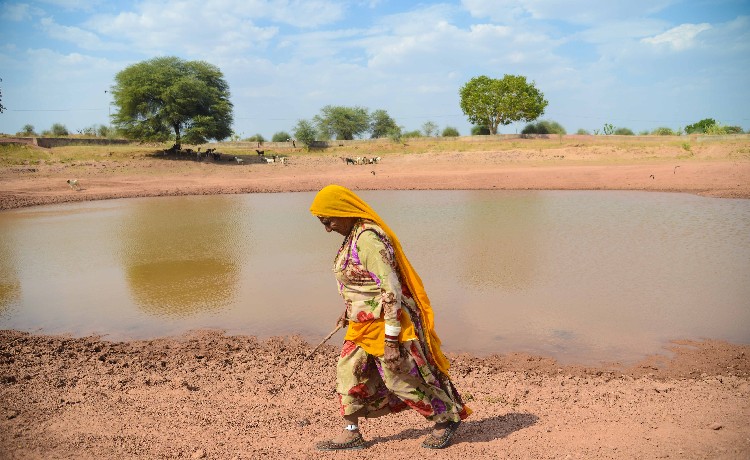In the arid landscapes of Rajasthan, India, a crisis silently unfolds—that of dwindling water sources and the slow but sure desertification of land that was once fertile. While some parts of the world grapple with the threat of melting glaciers and rising sea levels, the communities here face a different battle. One that is characterized by parched lands, cracked earth, acute water scarcity and relentless droughts. And the story has been repeating with increasing intensity, year after year!
Rajasthan's arid region is marked by a delicate ecosystem and an unforgiving climate. With scorching temperatures exceeding 50°C, frequent droughts, and parched lands, the hardships faced by communities are unimaginable. Drinking water scarcity intensifies as groundwater sources are strained, and lakes and ponds evaporate. The fear of desertification and loss of fertile land, only adds to the woes of the state! And yet, while over 90% of Rajasthan’s population depends on groundwater for life processes, ‘water’ remains one of the most poorly managed resource in the state.
Amidst these challenges, Ambuja Cement Foundation (ACF) has been leading grassroot-level initiatives across 14 districts of Rajasthan, for over two decades, to revive water sources and create resilient communities who can continue their fight against desertification and drought, with sustained impact.
Recognising the urgency to empower communities and tackle the water crisis head-on, ACF started a journey to reshape the narrative of water resource management, through a 5-fold program - inspiring behavioral and attitudinal shifts in the local communities.
Aiming for Change Through:
1. Revival of Traditional Water Bodies: ACF recognized the potential in reviving traditional water bodies, such as stepwells, which had fallen into disuse. By undertaking practical actions like debris clearance, desilting, and structural restoration, these reservoirs have once again become vital lifelines for communities, providing much-needed water for drinking and agricultural purposes.
2. Rooftop Rainwater Harvesting: By transforming rooftops into rainwater collection points, through channels and tanks that can capture and store rainwater for future use, ACF has activated local communities to take action. Driving this initiative are women volunteers, called Sujal Jankars. Major modifications in thought lead to tiny changes in behaviour over several years, which was precisely the ideological process behind developing the Sujal Jankars program. By creating active and passive awareness in the field to harvest rainwater efficiently, and empowering local people to understand the water table, assess water quality, and embrace water literacy, communities have been empowered to become drought resilient and begin to turn things around.
3. Groundwater Recharge - Rajasthan’s groundwater table is going down by a meter every year with water demand outstripping supply by about 30%. To replenish depleted aquifers and ensure a sustainable supply of groundwater, ACF constructed recharge wells, check dams and other innovative structures. These wells acted as gateways to replenish underground water sources, transforming once barren lands into thriving oasis. Powered by rainwater harvesting, groundwater recharge has been a major focus and indicator of change.
4.Promoting Sustainable Agriculture - ACF also played a pivotal role in promoting sustainable agricultural practices among farmers. Techniques such as drip irrigation, mulching, and crop rotation were actively advocated to reduce water consumption. Through training and demonstrations, farmers were empowered to optimize water usage, increase crop yields, and develop environmental harmony.
5. Enabling Water Literacy - Water literacy has become a key focal point of ACF's efforts. Through workshops, awareness campaigns, and community engagement programs, individuals are educated about the importance of water conservation, management, and sustainable practices. Armed with knowledge and understanding, community members have become active stewards of change, ensuring the longevity of water resources and building a resilient ecosystem.

The Impact
By undertaking these practical initiatives, ACF empowered communities to combat the challenges of desertification and water scarcity.
- The revival of traditional water bodies has saved women 2-7 hours of daily labor, fostering community cohesion, improving health and productivity.
- The total dissolved solids (TDS) level in water has witnessed a substantial reduction in the range of 300-5000 ppm. Moreover, the creation of 37 million cubic meters (MCM) of water storage capacity has significantly enhanced the resilience of water resources.
- The water table has experienced a remarkable improvement of 2.12 meters, further contributing to the sustainability of the region's water supply.
Farmers have witnessed an average increase of 64% in their agricultural income and transitioned from harvesting only one crop per year to up to three crops annually.
Once-dry stepwells now hold water, rooftops are adorned with rainwater harvesting systems, recharge wells dot the landscape, sustainable agricultural practices are embraced, and communities are now more self-sustained as far as water resources are concerned.
ACF's work serves as a testament to the power of purposeful action and collective efforts in building a sustainable future for arid lands, under threat from desertification and drought.





.png)

0 Comment